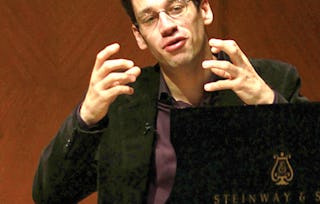In this course, learners will review sonata form and learn how the piano sonata was taken to new heights by Ludwig van Beethoven. We’ll discover together how the generation that followed interpreted Beethoven’s achievements and put them into practice in their own unique ways. From there, we will explore the “War of the Romantics”: the variety of formal structures for Romantic sonatas (both traditional and progressive) and the major repertoire of this era. You’ll hear some of the important pianos of the time, and understand the differences between Viennese and English/French traditions of piano music.

The Piano Sonata: Beethoven and the Romantics
Ends soon: Gain next-level skills with Coursera Plus for $199 (regularly $399). Save now.

The Piano Sonata: Beethoven and the Romantics
This course is part of Exploring Piano Literature: The Piano Sonata Specialization

Instructor: Matthew Bengtson
Included with
What you'll learn
Learn how the piano sonata was taken to new heights by Beethoven.
Explore the "War of the Romantics."
Understand the differences between Viennese and English/French traditions of piano music.
Skills you'll gain
Details to know

Add to your LinkedIn profile
8 assignments
See how employees at top companies are mastering in-demand skills

Build your subject-matter expertise
- Learn new concepts from industry experts
- Gain a foundational understanding of a subject or tool
- Develop job-relevant skills with hands-on projects
- Earn a shareable career certificate

There are 4 modules in this course
In the first week, you'll be introduced to the course structure and to the fundamentals surrounding sonata form and the history of the genre.
What's included
5 videos3 readings1 assignment1 discussion prompt
This week focuses solely on Ludwig van Beethoven. We will discuss matters of sonata theory, the developing piano, and the way that the piano sonata genre was transformed through his innovations. We will consider his sonata repertoire across three major periods.
What's included
10 videos5 readings3 assignments2 discussion prompts
This week focuses on Romantic composers following Beethoven. First we consider the German tradition - Schubert, Mendelssohn, Schumann, and Brahms - and then the great pianist-virtuosi Chopin and Liszt. Throughout the week we will consider both traditional and innovative approaches to constructing Romantic piano sonatas.
What's included
9 videos5 readings3 assignments2 discussion prompts
For more advanced learners, an Honors Formal Analysis is available in this final week (not required for completion of the course).
What's included
4 readings1 assignment1 discussion prompt
Earn a career certificate
Add this credential to your LinkedIn profile, resume, or CV. Share it on social media and in your performance review.
Instructor

Offered by
Explore more from Music and Art
 Status: Free Trial
Status: Free TrialUniversity of Michigan
 Status: Free Trial
Status: Free TrialUniversity of Michigan
 Status: Free
Status: FreeCurtis Institute of Music
 Status: Free
Status: FreeCurtis Institute of Music
Why people choose Coursera for their career




Frequently asked questions
To access the course materials, assignments and to earn a Certificate, you will need to purchase the Certificate experience when you enroll in a course. You can try a Free Trial instead, or apply for Financial Aid. The course may offer 'Full Course, No Certificate' instead. This option lets you see all course materials, submit required assessments, and get a final grade. This also means that you will not be able to purchase a Certificate experience.
When you enroll in the course, you get access to all of the courses in the Specialization, and you earn a certificate when you complete the work. Your electronic Certificate will be added to your Accomplishments page - from there, you can print your Certificate or add it to your LinkedIn profile.
Yes. In select learning programs, you can apply for financial aid or a scholarship if you can’t afford the enrollment fee. If fin aid or scholarship is available for your learning program selection, you’ll find a link to apply on the description page.
More questions
Financial aid available,





